|
|
|
Sort Order |
|
|
|
Items / Page
|
|
|
|
|
|
|
| Srl | Item |
| 1 |
ID:
142608
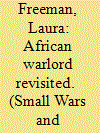

|
|
|
|
|
| Summary/Abstract |
To date, warlordism in Africa has been viewed solely negatively. This has come about, in part, because of the analytical lenses that have been used. Typically, warlordism has been examined at the state level; and behavioural traits, rather than definitionally necessary components, have been the focus. In effect, ‘warlord’ has been confused with other violent actors. I suggest here a reconceptualisation ‘from below’, which takes into account variation in types of warlordism, and which allows for both positive and negative effects of warlordism on society and the state.
|
|
|
|
|
|
|
|
|
|
|
|
|
|
|
|
| 2 |
ID:
173981
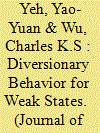

|
|
|
|
|
| Summary/Abstract |
This paper explores the mechanisms and circumstances under which leaders in weak states adopt diversionary behavior to deal with domestic problems. We examine the case of Taiwan to see if its President, Tsai Ingwen, has adopted diversionary behavior from 2016 to the present. We found that, unlike great powers, weak-state leaders often resort to non-force tactics such as blaming foreign opponents, but the emergence of diversionary behavior is conditional on the stability of their relationship with a major power. In the case of Taiwan, Tsai adopted a more confrontational foreign policy toward China only when USA–Taiwan relations had become more stable and more favorable toward Taiwan. Future work could continue to explore the circumstances and tools unique to weak states’ diversionary behavior.
|
|
|
|
|
|
|
|
|
|
|
|
|
|
|
|
| 3 |
ID:
122923
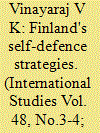

|
|
|
|
|
| Publication |
2011.
|
| Summary/Abstract |
The essay examines the threats and challenges that Finland has perceived first from imperial Russia, then from the Soviet Russia and now from the Russian Federation. Apart from studying the dynamics of Finland-Russia relations, it looks specifically at the Finnish responses for ensuring its sovereignty, independence and territorial integrity in general and the self-defence strategies adopted by Finland in dealing with potential threats from Russia in particular. This is done in the context of Paul Schroeder's categorization of self-defence strategies.
|
|
|
|
|
|
|
|
|
|
|
|
|
|
|
|
| 4 |
ID:
186122
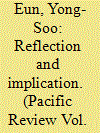

|
|
|
|
|
| Summary/Abstract |
This article elaborates on the following two questions and their implications. First, how can we as analysts offer compelling explanations for weak states’ agency and behaviours in the current global political and economic environments marked by multiplicity and fluidity? Second, what are the major causal factors that enable or influence weak actors’ agency, and under what conditions is their agency facilitated or constrained? Although an extensive literature in the discipline of International Relations (IR) confirms that today’s world is highly complex and diverse in terms of who or what matters in global politics, the subject of weak states and their agency is still not adequately discussed. Furthermore, the issues of methodology and theorising for the subject remain uncharted territory. By reflecting upon the main arguments and empirical findings of our special issue, this concluding article makes a case for ‘open-ended’ analytic eclecticism as an alternative methodological/analytical scheme, and lays preliminary ground for theorising weak states’ agency in the changed and changing global environments in the twenty-first century.
|
|
|
|
|
|
|
|
|
|
|
|
|
|
|
|
| 5 |
ID:
099561
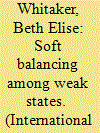

|
|
|
|
|
| Publication |
2010.
|
| Summary/Abstract |
Recent literature on the use of soft balancing to counter the hegemony of the United States has focused primarily on middle powers in Europe and rising powers such as China. But what about weak states? Do they simply go along with the hegemon, or do they challenge its policies despite the odds? And to what extent does the soft balancing argument explain their behaviour? In recent years, several historically friendly African countries have used non-military means to undermine the unilateral policies of the United States. Leaders in South Africa, Kenya, Nigeria, Tanzania, Mali, Namibia and Niger especially have resisted US demands in areas such as the 'war on terror', the International Criminal Court and the US Africa Command. This article seeks to explain the strategies of opposition that some African countries have pursued. It finds that the behaviour is driven both by regional power concerns and by domestic political considerations. Interestingly, public opinion in these relatively democratic countries is motivated by disagreements with US policy and by resentment of the predominance of American power. Thus, the evidence both confirms and challenges the notion of soft balancing. On one hand, the behaviour of African states is driven at least in part by the global balance of power-directly, as leaders respond to power concerns within the continent, and indirectly, as citizens pressure leaders to resist the hegemon. On the other hand, these findings challenge the underlying premise that state behaviour is determined solely by structural concerns. Instead, the oppositional behaviour of African states has both systemic and domestic explanations.
|
|
|
|
|
|
|
|
|
|
|
|
|
|
|
|
| 6 |
ID:
096864
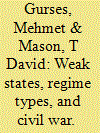

|
|
|
|
|
| Publication |
2010.
|
| Summary/Abstract |
A central theme in research on civil war and revolution is that 'weak states' are especially prone to civil war. Empirically, however, tests of this proposition have relied on proxy measures of state weakness such as GDP, mountainous terrain, and population, none of which directly measure features of the state itself. Earlier theoretical works point to particular regime types as being especially susceptible to civil war. We present a theoretical argument that delineates what regime types are more or less prone to civil war (and why) and test this theory with a series of logit models using Fearon and Laitin's and Sambanis' civil war data sets and Geddes' data classifying non-democratic regimes. The findings support earlier theoretical arguments that particular types of weak states - personalist or neopatrimonial regimes - are more prone to civil war onset than others.
|
|
|
|
|
|
|
|
|
|
|
|
|
|
|
|
|
|
|
|
|